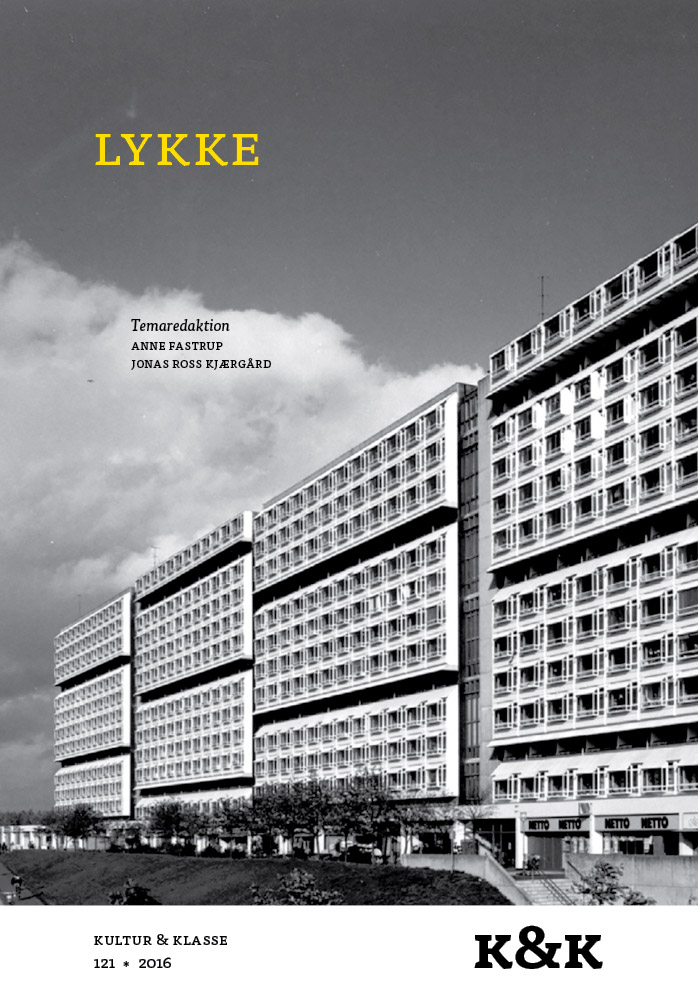Hvor vi altid kan være sammen
DOI:
https://doi.org/10.7146/kok.v44i121.23743Nøgleord:
Utopia, Social happiness, The Social Democrats, 1945, Future Denmark,Resumé
The Danish Social Democratic propaganda movie The Dream of Tomorrow was produced for the first post-war parliamentary election in Denmark in October 1945 to illustrate the project of social happiness as inscribed in the new electoral program of the party, Denmark of the Future. The vision of a future welfare state in the program was informed by new conceptions of the feasibility of relatively far-reaching social reform within capitalism, but also by concerns about the post-war strengthening of the Communist Party as a rival to the traditional hegemony of Danish Social Democracy, prompting the Social Democratic leadership to emphasize the radical nature of the change envisioned by the program. In the movie this specific political conjuncture of programmatic renewal and tactically determined rhetorical radicalism was translated into a synthesis of a political orientation towards immediate change and a utopian narrative of imaginary social happiness, seeking to appeal especially to young workers radicalized by the experience of occupation and resistance during the war. The overall result, however, was an uneasy balance between a political reform program and a utopian vison tied to the main ideological coordinates of the present, projected onto a future in which history seemed to have ended.
Referencer
Abensour, Miguel. ”William Morris: The Politics of Romance”. Revolutionary Romanticism. Red. Max Blechman. San Francisco: City Lights Books, 1999: 125-61. Abensour, Miguel. ”Den vedblivende utopi”. K&K 114 (2012): 123-42. Ahmed, Sara. ”Hvorfor lykke, hvorfor nu?”. K&K 121 (2016): 15-44. Andersen, Trine m.fl. Det saglige paradis – en analyse af to socialdemokratiske partifilm. Upubliceret universitetsopgave, RUC, 2002. Bang, Gustav. ”Fra Kapitalisme til Socialisme” (1902). Den materialistiske historieopfattelse i Danmark før 1945, I. Red. Uffe Østergård. Århus: Modtryk, 1973: 235-244. Benjamin, Walter. ”Om historiebegrebet” (1940). Kulturkritiske essays. København: Gyldendal, 1998. Bertolt, Oluf. En Bygning vi rejser. Den politiske arbejderbevægelses historie i Danmark. 3 bd. København: Fremad, 1954-55. Bloch, Ernst. Das Prinzip Hoffnung. Frankfurt am Main: Suhrkamp, 1959. Claudin, Fernando. Krisen i den kommunistiske verdensbevægelse. Fra Komintern til Kominform. Oslo & Århus: Pax & Modtryk, 1978. Dalgaard, Niels. Ved demokratiets grænse. Demokratisering af arbejdslivet i Danmark 1919-1994. København: SFAH, 1995. Davies, William. The Happiness Industry: How the Government and Big Business sold us Well-Being. London & New York: Verso, 2015. Finnemann, Niels Ole. I Broderskabets Aand. Den socialdemokratiske arbejderbevægelses idéhistorie 1871-1977. København: Gyldendal, 1985. Fremtidens Danmark: Socialdemokratiets Politik. København: Socialdemokratisk Forbund, 1945. (findes også via www.arbejdermuseet.dk). Hansen, Anette Eklund & Klaus Petersen. “Mellem arbejde og familie – arbejderbevægelsens syn på forholdet mellem familie- og arbejdsliv ca. 1945-1980”. Arbejderhistorie 4 (2000): 33-54. Jameson, Fredric. The Seeds of Time. New York: Columbia University Press, 1994. Jameson, Fredric. Archaeologies of the Future: The Desire Called Utopia and Other Science Fictions. London & New York: Verso, 2005. Jameson, Fredric. ”Utopiens politik”, K&K 114 (2012): 13-29. Kjældgaard, Lasse Horne. ”Fremtidens Danmark: Tre faser i dansk fiktionsprosa om velfærdsstaten, 1950-1980”. Kritik 191 (2009): 31-43. Koch, Hal. Hvad er Demokrati?. København: Gyldendal, 1945. Larsen, Steen Bille. Kommunisterne og arbejderklassen. En politisk biografi. København: Tiderne Skifter, 1977. Marin, Louis. Utopiques: jeux d’espaces. Paris: Les éditions de minuit, 1973. Mazower, Mark. Dark Continent: Europe’s Twentieth Century. London: Penguin, 1998. Müller, Jan-Werner. Contesting Democracy: Political Ideas in Twentieth-Century Europe. New Haven & London: Yale University Press, 2011. Nielsen-Man, Søren. Kurs mod demokrati? Kommunismens demokratigrundlag og DKP’s demokratiopfattelse 1919-1947. København: SFAH, 2008. Olesen, Niels Wium. ”Jens Otto Krag og ’Fremtidens Danmark’”. Historie 19 (1991): 46-72. Olesen, Niels Wium. ”Jens Otto Krag og Keynes”. Arbejderhistorie 1 (2001): 38-60. Rancière, Jacques. The Politics of Aesthetics, London: Continuum, 2004. Thing, Morten. ”Af velfærdsstatens tilblivelseshistorie”. Social Kritik 44 (1996): 10-19. Žižek, Slavoj. “The Spectre of Ideology”. Mapping Ideology. Red. Slavoj Žižek. London & New York: Verso, 1994: 1-33.
Downloads
Publiceret
Citation/Eksport
Nummer
Sektion
Licens
Tidsskriftet følger dansk ophavsret.





